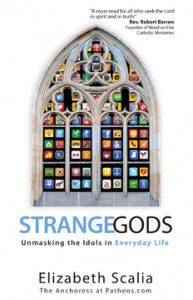I have recently accepted the call to be Pastor of South Congregational United Church of Christ in Centerville, Massachusetts. On a hilltop less than a mile from Craigville Beach in mid-Cape Cod, the setting of this historic congregation is just the other side of paradise. In the course of the search and call process, I was asked how I would lead the congregation toward new vitality and outreach in the community. My response to the Search Committee initially might have been perplexing, “I have a vision but not an agenda.” My response reflects my philosophy that our lives are holy adventures rather than purpose-driven projects. To me vision implies openness and willingness to change, while agendas, whether written on paper or stone, have a certain inflexibility such that we cannot be content or claim any sort of success unless we reach a goal we have set in advance.
In many ways, visions are open to change, correction, and creativity while agendas have a tendency to discourage innovation, novelty, and new directions. Agendas can easily become idols even if they are well-intended at the beginning.
 Elizabeth Scalia’s Strange Gods (now featured at the Patheos Book Club) is an open-spirited challenge to all the “musts” that we require in order to be happy, claim success, or live according to the one true faith. An idol is anything that can’t be questioned, must be preserved, or is non-negotiable. Ironically, religion is a factory of idols, to paraphrase John Calvin. Over the years, I have heard proponents of specific religious viewpoints identify the heart of faith with an unswerving devotion to: particular liturgies, patterns of celebrating communion or baptism, doctrines of the afterlife, requirements (gender, sexual orientation) for ordination, understandings of scripture or the divinity of Jesus, congregational traditions and deconstructing congregational traditions, childrearing, and politics, both left and right. Without being relativists, the truth of life is that all things are relative, that is, connected with particular histories, traditions, geographies, and belief systems. The first step in recognizing and confronting idols is to ask if a particular practice, ritual, tradition, or belief is non-negotiable, and then ask “what is the source of its non-negotiability?”
Elizabeth Scalia’s Strange Gods (now featured at the Patheos Book Club) is an open-spirited challenge to all the “musts” that we require in order to be happy, claim success, or live according to the one true faith. An idol is anything that can’t be questioned, must be preserved, or is non-negotiable. Ironically, religion is a factory of idols, to paraphrase John Calvin. Over the years, I have heard proponents of specific religious viewpoints identify the heart of faith with an unswerving devotion to: particular liturgies, patterns of celebrating communion or baptism, doctrines of the afterlife, requirements (gender, sexual orientation) for ordination, understandings of scripture or the divinity of Jesus, congregational traditions and deconstructing congregational traditions, childrearing, and politics, both left and right. Without being relativists, the truth of life is that all things are relative, that is, connected with particular histories, traditions, geographies, and belief systems. The first step in recognizing and confronting idols is to ask if a particular practice, ritual, tradition, or belief is non-negotiable, and then ask “what is the source of its non-negotiability?”
As I’ve charted my personal and professional life, I have noted certain attachments that I have needed to let go of to be faithful to God’s calling – in the moment and over the long haul. Moreover, I have noticed that many pastors – and also congregations – create conflict and alienation when their visions require inflexible agendas. The biblical tradition describes God as anything but inflexible: God is constantly on the move, adapting and responding to the ongoing history of the world. God constantly presents persons and communities with visions, but both God and humankind often have to revise these visions to respond creatively to the situation at hand.
Even Jesus had to let go of his agenda on many occasions to be faithful to God’s vision for his life. I think Jesus’ initial retreat in the desert was the first of his vision quests. In this case, he was seeking his life vision as God’s beloved child and messenger to humankind. He had to confront certain non-negotiables – certain goals that most people see as essential to a good life – power, safety, and comfort. None of these is bad – and in fact, we are seldom tempted by bad things; they become idols when they take us off course from our deepest vocational vision or visions.
Notice that I used plural visions and didn’t say true or authentic vocational vision. To have just one vision or calling is to become susceptible to idolatry. Remember after their dream, in which they were warned of Herod’s duplicity, the magi went home by another way. How often do we have to go home or continue our journey by a pathway that we had not initially chosen? Perhaps, we were forced to take a different path as a result of serious illness, downsizing, divorce, or new insights. To assume that we will only be happy if we take one route is to be in serious danger of placing an idol in front of God’s vision for you given the new circumstances of life. Remember how Jesus affirmed a foreign woman’s critique of his restricting of his mission to the Jewish community, and immediately changed course by healing her daughter.
Theologically speaking, this means that God must constantly revise God’s vision in light of new events – in the world and in your life. The Divine Artist balances history, context, personality, tradition, and immediate changes, with God’s aim at beauty and wholeness for us and our impact on the world in which we live. New possibilities emerge and faithfulness to God requires us to explore the new vocations – of the moment, of a community, and over the long haul. Our limited awareness of the divine perspective suggests that holding on to idols of nationalism, religious imperialism, scriptural fundamentalism, priestly gender, unbending religious language, and political and linguistic correctness of all kinds stands in the way of our faithfulness to God. In the same vein, absolutist pro-choice, pro-life, and pro-gun positions seem to place abstract ideals – otherwise known as idols – ahead of the well-being living breathing persons and the evolving vision of a living loving God.
Elizabeth Scalia’s Strange Gods is, at the end of the day, a challenge for us to be open and unattached even to our own most deeply-held values, beliefs, rituals, and pastimes. When we say “I will never be happy unless…” whether as parents or parents, we have created an idol which will eventually lead to unhappiness and conflict.
Our calling is to be faithful, not inflexible; to look beyond our own agenda to larger visions; to grow with new insights and embrace new possibilities. Our traditions, lifestyle, pastimes, and faith positions have value (at least, many of them do); but openness to God precludes a stopping point or the erecting of a non-negotiable line in the sand. Behold, God does a new thing – open your eyes and heart, let go of inflexibility, and dance with the Spirit.













